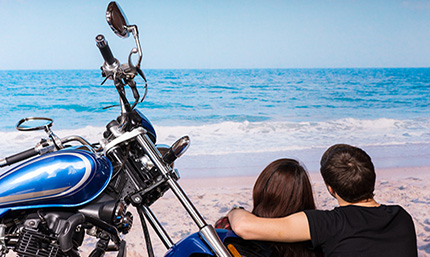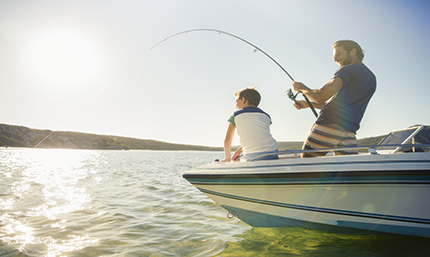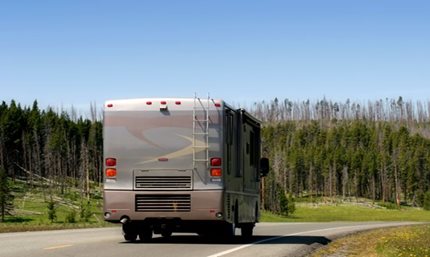News & Tips
Florida Guide to Financing an RV for Less

Living in Florida means that you reside in a climate where you can enjoy outdoor recreation throughout most of the year. This is true for both terrain lovers, with a recreational vehicle/trailer, motorcycle, or scooter, and for aquatic aficionados, with a boat or jet ski. If any of these activities sound good to you, and you’re ready to make a used or new purchase, then you’re in the right place to learn more about getting the financing you need for your fun.
Ready to apply now? Find the best RV loans at SCCU.
Recreational Vehicles (RVs)
From car-pulled trailers in the early 20th century to today’s amazing models, RVs have evolved in incredible ways to the point where modern models have something for just about everyone. In a 2022 Florida RV SuperShow, some display RV models contained mobile offices, allowing people to travel and work in their recreational vehicle. Some models feature minimalistic designs with multi-purpose furniture, and others facilitate off-grid living, electric powertrain options, and more.
You may be RV shopping to use this vehicle for traveling and camping—or you may envision it as a core part of your lifestyle (especially if you’re looking to retire or work remotely). RV camping can provide the ultimate in comfort as a getaway experience, even when weather conditions aren’t ideal, with no need to hunt for a hotel. Having your own private space became even more important during the COVID-19 pandemic, and many Americans turned to RV living, recreation, and camping as a way to experience the outdoors comfortably and safely.
This kind of recreational vehicle provides significant flexibility, too. In an RV, you can enjoy time with family and friends, head on the road solo, or stay in places where you can participate in a wonderful community of fellow RV campers.
Did you know that one million Americans live in their RVs full time? Perhaps that’s your current or future plan. Benefits of this include a payment that’s typically much less than a mortgage payment, with plenty of other cost reductions or eliminations.
Choosing the Right RV
As previously mentioned, people buy RVs for a variety of reasons. So, what’s right for you will most likely include an optimally sized vehicle with the appropriate features and accessibility to fit your needs—and your budget. You may be shopping for a motorized RV or a trailer that’s pulled behind your vehicle. No matter what intrigues you, when purchasing an RV, it’s important to think about your present and future needs.
Consider how often you’ll use the RV; for what lengths of time (months or seasons); in what settings (in remote locations, for example, or in a family-friendly campground with plenty of amenities); and, if choosing a trailer model, what your vehicle can safely tow.
The demand for RVs continues to hold strong, so it makes sense to prepare yourself by making sure all of your financial documents are in order while you wait to secure the perfect vehicle for your lifestyle dreams, and even get pre-approved. You can also use this exploration time to get an overview of what insurance you’ll need.
Money-Saving Tips
This article focuses on saving money by finding an RV loan with terms that best suits your needs. However, even after your purchase, you can continue to reap the rewards of RV ownership and save money in the following ways:
- Find places where you can park for free. This can take a bit of upfront online research, and as you become part of an RV community, you can ask fellow RV aficionados for recommendations. If you find parks you love that charge fees, see how you can obtain discounts at those locations, perhaps through loyalty programs.
- Keep your tires properly inflated and drive in ways to improve your gas mileage. Use GasBuddy.com or a similar app to find the cheapest places to fill up.
- Stay in one place for a longer amount of time. You may get discounts from parks that way, and you’ll spend less time driving (using gas) and more time enjoying the RV camping experience.
- Use Groupon and similar sites to find discount coupons for sites you want to visit. When possible, tour free places of interest—sometimes state and national parks in Florida offer fee-free days.
Here are 10 more creative ways to save money that can help you put more money towards your RV adventures.
Plus, of course, when you can obtain recreational vehicle financing that comes with a lower interest rate and fewer (or no) application fees, then these can be attractive money savers.
Securing the Best RV Financing
When it’s time to apply for RV financing, the two main types of financial institutions are banks and credit unions. We’ll share information about the overall application process first and then describe the benefits of choosing a credit union for the best RV loans.
When comparing lenders, be sure to consider the following:
- Interest rates and annual percentage rates (APRs) currently being offered; the APR is more of an apples-to-apples comparison because it also factors in the cost of borrowing
- Loan program types: a fixed rate, for example, or an adjustable one (which fluctuates)
- Term lengths allowed; this will have an impact on your monthly payments and interest paid over the loan’s life; with all other things being the same, this means that:
- shorter terms come with higher principal and interest payments but less money paid back in interest over the life span of the loan
- longer terms come with lower principal and interest payments but more money paid back in interest over the life span of the loan
- Monthly payments; you can use our RV calculator to estimate yours
- Down payment amount required
- Loan fees/closing costs
Each lender may have different requirements. At SCCU, we offer RV loans with terms up to 240 months (20 years) for qualified borrowers with no application fee. A qualified borrower is someone who meets minimum requirements, including a certain credit score and debt-to-income (DTI) ratio.
Interest rates for RV financing often consider credit scores the most. Numerous sites online provide credit score information, sometimes for a fee, and other times, for free. If you have any concerns about yours, you can get a free copy of your credit report from each of the three main agencies once a year at AnnualCreditReport.com. If you see any data on the reports that are inaccurate, be sure to request the credit bureau to make corrections.
Here’s more information about how your credit score may affect your RV financing interest rate at SCCU. Scroll down a bit to the Boat and RV Loan Calculator, and chose “RV Purchase” in the loan type dropdown box. Then, enter a credit score in the credit score dropdown box. Enter what you expect your loan amount to be and choose a term (with lots of options from 36 months to 240 months—loan term options may vary based on the loan amount).
If your credit score might cause a problem with loan approval or you’d like to boost yours to get a better interest rate, here are a few strategies that may help:
- Make all minimum payments on time.
- If it helps, set up automatic payments for your bills and ensure that enough funds are available to transfer these payments on or before their due dates.
- Manage your credit utilization scores. To calculate yours, add up the balances of your revolving credit accounts (such as credit cards). Compare that total amount to the total amount of credit allowed, and ideally, this amount should be below 30%. If not, work towards paying off your balances.
- Once you pay off a credit card, there is value in keeping it open since credit history is a factor in credit score algorithms.
- Consider having a combination of revolving debt and installment loans (like car loans or personal loans) in your credit mix.
You can use our free credit score worksheet to keep track of how yours changes.
Another key factor in getting RV financing approved is having an acceptable DTI. Here’s an example. Let’s say that monthly debt payments include the following:
- $800 mortgage
- $400 car
- $100 credit card payment
This is $1,300 in monthly debt. Now, let’s say that your gross income is $4,000 a month. If you divide the debt by the income, this is a DTI of 32.5%. Now, let’s say that you want to borrow $30,000 for a used RV and the payment would be $240.00. Your DTI with the RV payment would now be $1,540 with a DTI of 38.5%. The question becomes whether a lender is willing to approve a loan with this DTI ratio.
Because the RV would serve as collateral for the loan, you’ll need to ensure that your preferred lender will finance the type you want. In general, a financial institution will offer loans for travel trailers, fifth wheels, pop-up campers, class A motorhomes, and class C motorhomes. The condition, model, and age of used vehicles may also play a role in whether a lender will use the RV as collateral. Learn more about RV classes here.
| Type | Payment Period | APR* "As Low As" |
|---|---|---|
| Boats & Watercraft | Up to 240 Months Term determined by loan amount |
6.49%Rate determined by loan amount |
| RVs | Up to 240 Months Term determined by loan amount |
6.99%Rate determined by loan amount |
Rates shown are fixed Annual Percentage Rates and are subject to change. Your actual rate and terms are affected by your creditworthiness, term selected, vehicle type, model year, and loan amount. Certain restrictions apply. You may be asked to furnish a down payment. Florida loans are subject to Documentary Stamp Tax. The tax amount is not included in the quoted APR.
Boat Loan Payment: Example - Monthly payments of $10.76 per $1,000 borrowed for 144 months at 7.89% Annual Percentage Rate (APR). About this Example: The loan costs example is based on the most common selected rate and repayment months term and assumes that all the payments are made on the date they are due.
RV Loan Payment: Example - Monthly payments of $10.68 per $1,000 borrowed for 144 months at 7.74% Annual Percentage Rate (APR). About this Example: The loan costs example is based on the most common selected rate and repayment months term and assumes that all the payments are made on the date they are due.
Bank Versus Credit Union Recreational Loans
Let’s highlight the benefits of getting recreational loans at a credit union, whether that’s for an RV, boat, or motorcycle. Credit unions offer a variety of benefits because they’re not-for-profit financial cooperatives that are specifically designed to help its members attain and enhance their financial wellness. Banks, meanwhile, must consider the interests of their stockholders when setting rates, determining fees, and so forth.
Credit unions are typically created for people who live in a certain geography, work in a particular profession, or otherwise have required affiliations. For example, to become a member of SCCU, you must live or work in one of these counties located in Florida. If this is true for you, you can become a member by opening a Share Savings account for $5 online or at one of our 60+ branch locations nearest you.
Here are some of the benefits of becoming a member at a credit union:
- Interest rates are usually lower, which is a key factor when seeking a loan for RVs or other recreational vehicles.
- Fees are typically lower or waived, too. At SCCU, there is no application fee, for example, for an RV loan.
- Credit unions return surplus income to their members in the form of higher dividends, better rates, and lower fees.
- At SCCU, we make loan decisions locally.
- You’ll receive personalized service, including but not limited to, financial wellness education.
- Simply by becoming a member, you’re supporting your community.
Now, here’s more about recreational loans at SCCU.
Best RV Loans at SCCU
As an SCCU member, you benefit from competitive RV loan rates with terms up to 240 months—with no application fees or prepayment penalties. Approval decisions are fast with a simple, electronic Express Sign closing, or you can close at an SCCU branch. You can benefit from free online and mobile banking and may even qualify to wait 120 days to make your first payment. You can apply online or call the branch nearest you.
If you apply online, be sure to have the following information ready (for yourself and for any co-applicant):
- Social Security numbers
- Driver's license numbers
- Employment information
- Income information
When you hear the term “recreational financing,” you may think of an RV. SCCU also offers loans for other motorized means to enjoy outdoor adventures, including motorcycles, boats, jet skis, and other types of vehicles.
Boats, Jet Skis, and Other Watercraft
When you think of Florida fun, it’s natural to think about the ocean and other waterways where you can enjoy boating. From fishing to water skiing and snorkeling to sunbathing, boats and Florida go together perfectly—and today’s boat models offer attractive features.
For example, just like with cars, increasing numbers of watercraft, including jet skis, are powered by electricity. This creates a quiet ride without toxic fumes. If a watercraft isn’t electrically powered, it may be a hybrid model as the industry is moving to become greener and more efficient.
Today’s boats are lighter and more durable than their predecessors, which before the invention of modern materials were made of heavy wood or thick fiberglass. Modern boats are also incorporating solar panels to run shipboard electronics, which promises lower operating costs and carbon emissions.
Choosing the Right Watercraft
As you shop around and look at pricing, this Florida boat guide can help you to decide whether a new or used boat would be right for you and what size will fit your needs and your budget.
When considering your budget, think beyond just the boat itself. For example, some require registration fees, and you’ll need to compare prices of insurance policies and storage options. Depending upon why you want to buy a watercraft, you’ll likely want to buy equipment to enjoy your boat and use it safely.
If you buy a new boat, check the warranty to see what’s covered. With a new watercraft, you’ll have fewer maintenance and repair costs than if you buy a used boat. However, would the money you’d save on a secondhand boat make it a better choice than a new one under warranty that costs more? A new boat is likely to have a more fuel-efficient engine, so factor that cost in, too.
Best Recreational Loans for Boats
The application process for watercraft loans is similar to that for an RV with borrowers needing to have acceptable credit scores and DTI ratios to qualify. Here, you can see current boat loan rates and estimate your payment based on your term and credit score. Scroll down the page to the Boat and RV Loan Calculator section. Make sure that the top left dropdown is in the default position of “Boat Purchase” and then choose the credit score range that yours falls into along with the loan amount and term desired. If you’re ready to get started, apply here.
Going on the Open Road with Motorcycles and Scooters
Motorcyclists in Florida enjoy a year-round riding season, and thanks to a thriving motorcycle culture there are plenty of gatherings and events to attend whether you’re on a bike, trike, or moped. Aside from the upfront cost of protective gear, equipment, and insurance, motorcycles offer a much more affordable way to commute to and from work or school.
Just like other recreational vehicles, motorcycles have continued to evolve, and now offer a wide range of models to suit the needs of different riders. Electric motorcycles are the newest addition to the scene, offering the climate-conscious a way to get on two wheels. Other major offerings include newer liquid-cooled bikes with very fuel-efficient engines, classic oil and air-cooled twins, and sportbikes that carve twisty canyons with ease.
New motorcycles and scooters benefit from better ergonomics and safety systems such as ABS, disc brakes, cruise control, and multiple ride modes. Plus, modern helmets and other personal protective equipment benefit from years of safety research by both American and European counsels, offering hands-free navigation, rider coms, and even built-in cameras.
When shopping for a motorcycle, it’s important to consider what you want to get out of the experience. If you’re looking to commute long distances, you may be pulled towards cruiser-style touring bikes. Is speed your ambition? Then sportbikes and supermotos may call your name.
Maybe you want to go off the beaten path and experience nature, in which case, an adventure bike, scrambler, or dual-sport can get you there. Each type benefits a different kind of rider, and depending on your own preferences for seat height, weight, and engine displacement, this could influence which one you gravitate towards.
After considering all of the pros and cons of the lifestyle, taking an MSF safety course and getting your motorcycle endorsement, you’ll finally be ready to secure the funds to take home the ride of your dreams.
Best Recreational Loans for Motorcycles and Scooters
SCCU offers motorcycle and scooter loans for up to 72 months with no application fee, and you can find your rate and estimated payment here. The process is similar to what’s described for RV and watercraft loans. You can also easily apply online here.
You’ll need to meet certain criteria for credit and DTI ratios, and typically, the motorcycle or scooter will serve as collateral. If a scooter comes with an engine of 50ccs or more, then you’d apply for a motorcycle loan to get the best RV loans.
If the engine is smaller than 50cc, then SCCU recommends and offers no-collateral personal signature loans. All of our motorcycle and scooter loans come with competitive credit union interest rates; fast, local approvals; and convenient online closing.
| Type | Payment Period | APR* "As Low As" | Payment per $1,000 |
|---|---|---|---|
| Motorcycles and Scooters 2021-2025 | 36 Months Term determined by loan amount |
6.49% | $30.64 |
| Motorcycles and Scooters 2018-2020 | 36 Months Term determined by loan amount |
6.99% | $30.87 |
| Motorcycles and Scooters 2017 & Older | 48 Months Term determined by loan amount |
11.25% | $25.97 |
Rates shown are fixed Annual Percentage Rates and subject to change. Your actual rate and terms are affected by your creditworthiness, term selected, vehicle type, and model year. Certain restrictions apply. You may be asked to furnish a down payment. Florida loans are subject to Documentary Stamp Tax. The tax amount is not included in the quoted APR.
Scooters: Engine size of 50cc’s or greater will be treated as a motorcycle loan. Anything less than 50cc’s will be considered a signature loan.
Apply for Your Loan for RV: Recreational Vehicles, Watercraft, and Motorcycles
SCCU was founded by seven members on June 7, 1951, as Patrick Air Force Base Credit Union, serving 28 members with $372 in assets. Today, SCCU serves more than 500,000 members with more than $7 billion in assets, and we’re now the third largest credit union in Florida.
So, whether you’re looking for your next adventure with a boat, RV, or motorcycle, we got you covered in the low-rate8 loan department with flexible terms9! We also offer exclusive rates for community heroes. On top of free Online and Mobile Banking, members also enjoy SCCU Member Service for the life span of the loan.

















.jpg?width=430&height=257&ext=.jpg)




